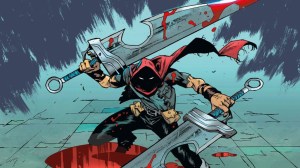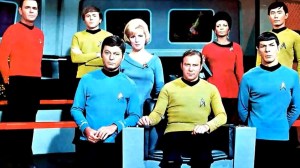
Writer Jeff Lemire has brought new levels of pathos, action, and horror to Bloodshot, the toughest assassin in the Valiant universe, since writing the character in The Valiant. Beginning in the story “Colorado”, Lemire has taken the mercenary down a tough road of reflection and possible redemption. In 2016 that story will leap forward into the future in “The Analog Man.” Lemire along with artist Lewis LaRosa will see what happens after Bloodshot has found some sense of peace as the protector of a post-apocalyptic town under threat. ComicBook.Com had a chance to ask Lemire a few questions about what makes Bloodshot such a compelling character and what this new setting will reveal about him.
Videos by ComicBook.com
“The Analog Man” won’t be your first time tackling a post-apocalyptic landscape. Sweet Tooth is based in a very similar setting and is one of your most lauded comics series to date. What is it about a world after the fall of humanity that attracts your interest?
Jeff Lemire: I’ve always loved the post-apocalyptic genre. It’s hard to pinpoint why exactly, I just love seeing characters struggle through the very EXTREME circumstances these stories provide. I love seeing the last remnants of humanity clinging to life against all odds. It makes for big drama and great metaphors.
And why do you think that placing Bloodshot in this sort of setting is valuable? Do his skills and abilities become less anti-social in a world where killing for survival has become the norm?
Lemire: The key here is that when we catch up with Bloodshot, he is very different from the Bloodshot we’ve known in the past. The events at the end of the “Colorado” arc currently being published will change him in a big way, so the Bloodshot we see in “The Analog Man” really is a changed man. He is not a killer but a protector.
The other thing I find very interesting about this shift in setting is that it holds some resemblance to a Western with a small town, a reluctant gunslinging protector, and a controlling menace threatening the frontier. What does that genre and its tropes reveal about Bloodshot? Does it present him with challenges he couldn’t find in a civilized America?
Lemire: I loved the idea of throwing Bloodshot into a western setting like this. In the past, Bloodshot stories have been very much contemporary and militaristic. I wanted to create a series where each arc was almost a whole new genre, and then explore what each of those genres can bring out in Bloodshot that we haven’t seen before. So “The Analog Man” is very much a Western, whereas “Colorado” was more of a Horror or Thriller. Then, the next arc will be much more of an “Action Adventure.”Genre is a great vehicle or exploring new facets of existing characters.
Both Westerns and post-apocalyptic stories tend to be very violent, which is something that Bloodshot certainly doesn’t shy away from. Is there something unique about Bloodshot’s connection to violence that compels you?
Lemire: In “Colorado” we really took a hard look at violence in the media and violence in our modern society and used Bloodshot, who is traditionally a very violent character, and sort of turned him inside out. We inverted him and used him as a way of exploring these things, and really took a very anti-violence, anti-gun stance with the book. In “The Analog Man” I wanted to project forward and see where this new outlook may tale Bloodshot if he is thrown into an even harsher society—one where all our worst nightmares come true.
And as someone who both draws and writes comics, what is it about Bloodshot and the intensely violent nature of his stories that interests you in “seeing” him on the page?
Lemire: As I said above, a straight action hero, or a really violent character, holds little appeal to me. I’m not big on gore or violence for the sake of it. But I think my take on Bloodshot is about taking a real look at the way we use violence in stories, examining it, and holding up a mirror to ourselves.
Beyond just the change in scenery, “The Analog Man” shifts Bloodshot Reborn 30 years into the future. Is this going to read like a continuation of what you’ve written so far? What kinds of themes are connecting from Bloodshot’s stories following The Valiant?
Lemire: This story is very much the next chapter of what I have written so far. It is not an “Elseworlds” or imaginary story. It will connect directly to what we’ve seen and also set up the next storyline.
That shift presents an opportunity too. Are you working to craft “The Analog Man” as a place where new readers can join the series without having read about what came before?
Lemire: I try to make every new arc an accessible jumping-on point. Longtime readers will also be rewarded, but “The Analog Man” is a great starting point for sure.
You’re working with artist Lewis LaRosa on “The Analog Man.” What first drew you to his work?
Lemire: I was a big, big, big fan of PUNISHER MAX. It was one o f the reasons I wanted to do Bloodshot so badly. I wanted to do my own version of the kind so stories Ennis did in that series. And Lewis was one of the artists on that book, so I was thrilled to get a chance to work with him.
And his stuff is quite simply jaw-dropping. It is stunning.
And having had a chance to look at all of his completed work so far, what are you most anticipating readers actually getting a chance to see once The “Analog Man” arc begins?
Lemire: I really love the way the Ninjak/Bloodshot friendship developed in this story. I didn’t anticipate Ninjak being quiet as big a part of the story as he ended up being, but writing the two characters together was just so much fun.
Chase Magnett is a freelance journalist, critic, and editor working with comics, film, and television. He has been hooked on comics since he picked an issue of Suicide Squad out of a back issue bin fifteen years ago. When Chase is not working with comics in some way he spends his time rooting for the San Francisco 49ers and grilling. He currently contributes to ComicBook.com and other outlets.









